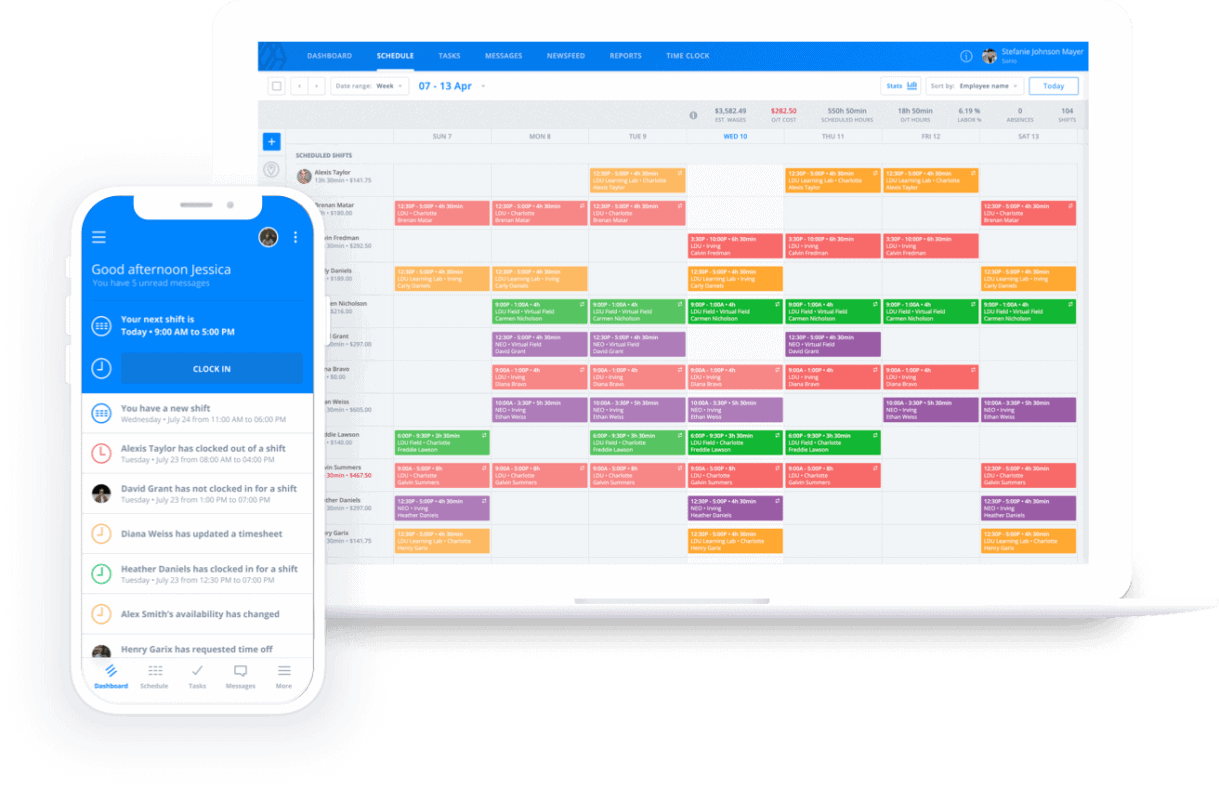How To Create And Use A Disciplinary Action Form
Not sure how to create and use a disciplinary action form? The experts at Sling ...

Countless managers and owners before you have asked themselves, “Why is teamwork important in my business?” The answer might surprise you. When you strip away all the excess, the importance of teamwork cannot (and should not) be underestimated.
It’s the bedrock on which all successful businesses are built. As a manager, you should never take teamwork for granted. To do so invites a dysfunctional team — and eventual disaster.
But what exactly is teamwork? Why is teamwork important for success? And how can you go about building teamwork in your business?
In this article, the experts at Sling answer those questions to help you foster a sense of unity among your employees.
It may seem like a simple question, but the answer often eludes many managers.
At its most basic, teamwork is a sense of unity. It’s an enthusiasm that a group of people shares for their common interests and responsibilities.
But delve deeper and you’ll soon see that teamwork is both a bonding agent and a lubrication of sorts. Teamwork brings people together (the bonding agent) and motivates them to rely on one another to get things done. Teamwork also makes progress easier (the lubrication) and allows the group to overcome obstacles that would have stymied an individual.
Without teamwork, none of that would be possible.

Teamwork among a diverse group of people will almost always reveal new, fresh ideas. And those new ideas are invaluable in today’s competitive business environment.
The differing ages, backgrounds, skill sets, and experience levels of a team means that there’s a unique perspective just waiting to be heard. When you create a safe space where individuals can work together as a team without the fear of criticism, new ideas and perspectives will start to flow.
If you want to improve efficiency in your business, get your employees to work together. This will allow you to split difficult tasks into more manageable chunks and complete them faster. It’s also a great way to ensure that the person with the most skills is working on the part that suits him or her best.
The quality you expect from your project (or just your business in general) may be too much for one person to handle. But with teamwork, you get the best that everyone has to offer. As a result, that equals higher quality on a more consistent basis because you’re not relying on only one person.
If you want people to feel better about themselves and the job they’re doing, get them to work together. The morale boost they will receive highlights the importance of teamwork at the office.
When teamwork is a priority, your employees will feel:
That boost in morale makes every aspect of your business better.

Group cohesion is essential for businesses focused on success. Without it, individuals will be more likely to apply their efforts for their own benefit rather than the benefit of your company. And with everyone working toward slightly different purposes, your project — and your business — will suffer.
Working as a team allows your employees to see the successes and failures of others in a supportive environment. More than that, working as a team allows your employees to learn from each other without undue risk.
For example, when things go awry, the team can pull together to make them better. But in the process, everyone learns what not to do next time. That can provide insight into how to get things done more effectively the first time around.
The encouragement and support you get from working together as a team make the accomplishments that much sweeter. That, then, can feed over into a renewed sense of individual purpose and confidence that can reinforce the group as well.
It’s very much a self-fulfilling cycle where accomplishment breeds accomplishment and success breeds success.
If you tasked one employee with solving a problem, how many different viable solutions could they come up with? Maybe two or three?
But what if you tasked your team with solving the same problem? How many different viable solutions could they come up with? Two or three from each team member.
There may be some overlap in ideas, but that’s still plenty of options. Those options give them and you the opportunity for faster, more reactive innovation. That can mean the difference between getting ahead in your business and falling behind.

When individual employees work together as part of a team, there’s a sense of self-monitoring that isn’t present when they work by themselves.
This self-correcting behavior means that the manager doesn’t have to get involved as often as they might with individuals. That’s good for you and, ultimately, for your team who now benefits from more autonomy.
When your employees work together and succeed together, they form strong working relationships. Those relationships can grow to include mutual trust — and maybe even friendship — under the right circumstances.
That’s beneficial for your business because trust and friendship (and strong working relationships) generate:
Those are traits that every manager wants their employees to exhibit. You can nurture those traits by working as a team.
Teamwork at the office also creates a healthy sense of competition among coworkers.
This isn’t the type of competition that generates antagonism and bad feelings. Instead, it’s the type of competition that inspires your employees to do their best work all the time, overcome obstacles, reach out for more responsibility, and push your business to the next level.
You can nurture this healthy competition — along with a strong sense of team — by providing the right challenges and rewards to a group that shows signs of pulling together to get the job done right.

Now that we’ve discussed the importance of teamwork, we’ll turn our attention to how to make this possible. Building teamwork in your business doesn’t have to be an uphill battle.
In fact, it can feel like (and actually be) play sometimes. Here are some of the best ways to foster a sense of camaraderie and togetherness at work.
Setting goals at the team and individual levels is an important part of fostering strong teamwork. You can take that concept even further by making the question, “Why is teamwork important?” a part of your functional, business, and corporate strategies.
This keeps the concept and practice of team unity in full view at all times and reinforces just how important it is to you, your employees, your teams, and your business.
For more insight into establishing guiding strategies for your business, take a few minutes to read these articles from the Sling blog:
Games are some of the best ways to bring your team together and build unity.
Struggling for ideas? Try these simple, fun, and quick activities to keep your employees engaged and working well together.
When you actively strive to answer the question of why teamwork is important and build a sense of unity in your business, you ensure that your employees will be able to handle (both together and on their own) any challenge that comes their way.
Want more ways to bring your employees together as one? Check out these articles from the Sling blog:
Hiring a diverse team is essential for the unity of the group and the success of your business.
Such a team fosters creative innovation and gives your team more skill, more talent, and more experience. That translates to higher productivity, increased motivation, improved employee performance, and stronger group cohesion.
If you want those things for your business, hire with a diverse team in mind. Whether you’re looking for a barista, a food runner, or a customer service rep, hire people of all ages, backgrounds, and experience levels.
The mix of cultures, viewpoints, and personalities will create a stronger sense of team.

An easy way to foster teamwork is to emphasize inclusion for all employees. At its most basic, inclusion is about making sure each and every team member feels valued.
You can do this by ensuring that all employees:
To get started promoting inclusion — and making your team stronger — show your employees that their thoughts, ideas, and perspectives matter.
In addition, make sure that you and your team consider every point of view before settling on a decision that affects your business.
Sometimes, it doesn’t matter how hard you try to build teamwork in your business, some personalities just won’t mesh.
That doesn’t mean you have to give up on the concept of teamwork, nor does it mean that you have to start letting people go. It could be as simple as switching up who works with whom day in and day out.
You can gain insight into this aspect of your team by conducting a workplace personality test during the hiring process or during one of your mid-year performance reviews.
With this information in hand, you can help your team members get to know themselves and their teammates better and come up with ways that everyone can work better together.
When examining the question, “Why is teamwork important in my business?” many owners and managers want to focus on the big picture right away. Sometimes, though, it’s more beneficial to zoom in on the individual and start from there.
Nurturing morale and promoting teamwork one employee at a time is a great way to pave the way for bringing everyone together as a cohesive unit.
Once individual morale is high, you can turn your attention to making sure each member of the team works well with the other members of the team.
As a manager, you are the guiding force for your team (and the impetus behind the teamwork they exhibit). Does that mean you need to do everything for them? Absolutely not. It’s your job to communicate the necessary objectives, then get out of the way and let them do their jobs.
Oftentimes, that means delegating authority. By giving your team members the power to make decisions on their own, you help them stretch, grow, and improve. That, in turn, goes a long way toward building teamwork throughout the business.
When you do delegate authority, just make sure that everyone is clear about when they still need to get your authorization.
Whether it’s the end of a project or an individual accomplishment, celebrating those successes is key to building strong teamwork. And don’t be the only one to offer kudos and appreciation; encourage your team to celebrate without you as well.
By all means, arrange for a team lunch after the successful rollout of a new product or service, but then let them go out for drinks after work on their own. Doing so builds camaraderie, acts as an incentive for the next round of work, and reinforces the teamwork you’ve already built.

Answering the question, “Why is teamwork important for my business?” is an important first step in recognizing its overall value. Once you’ve done that, you can experiment with ways to improve the unity of your team.
One surefire way to do so is to streamline and perfect your business’s scheduling process to create a strong and stable foundation on which your team can operate.
In fact, we recommend that all businesses start with this essential first step before moving on to the other suggestions on this list. Scheduling is just that powerful.
And to help you and your team on the road to a strong sense of team, download the Sling app for free today. When it comes to organizing, managing, and optimizing your workforce, there’s no better suite of tools than Sling.
The heart of the Sling software is its artificial-intelligence-based scheduling module that includes intuitive features like:
Sling also contains a built-in time clock and employee work and attendance tracker. With this unique feature, you can turn any smartphone, tablet, or computer into a clock-in, clock-out tool.
You can even control labor costs and prevent time theft by establishing geofences around your business and setting limits on how early and how late employees can clock in or out.
But the benefits don’t stop there. With Sling, you also get:
When you harness the power of the Sling app, you’ll save countless hours each week that you can then dedicate to improving teamwork in your business even more.
For more free resources to help you manage your business better, organize and schedule your team, and track and calculate labor costs, visit GetSling.com today.
See Here For Last Updated Dates: Link
This content is for informational purposes and is not intended as legal, tax, HR, or any other professional advice. Please contact an attorney or other professional for specific advice.
Schedule faster, communicate better, get things done.